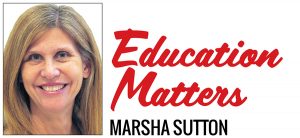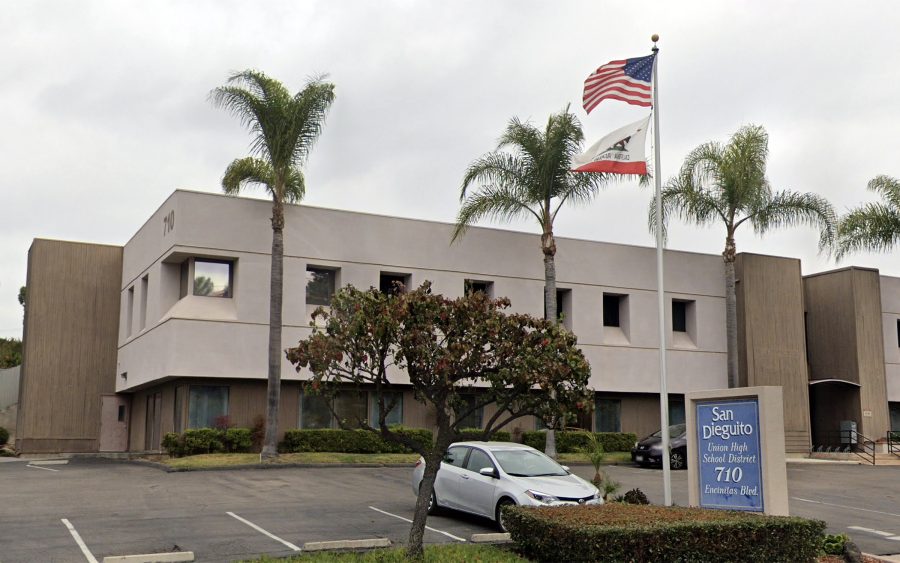In what was expected to be an unusual show of unity, the San Dieguito Union High School District’s Board of Education, at its Oct. 26 meeting, seemed to enthusiastically support a partnership with San Diego’s National Conflict Resolution Center.
With every trustee praising the potential for conflict resolution in the often divided school district, which has been plagued in recent years with heated dissension, a unanimous vote to approve what the district is calling the One San Dieguito Initiative was anticipated.
That is, until Trustee Phan Anderson asked NCRC President Steven Dinkin for the definition of a woman.
Before that, during board discussion, Anderson said, “One San Dieguito Initiative can’t come soon enough.”
Anderson, who was elected to her first term in 2022, then said she agreed with public comments made by the Christensen family and parent Wendy Christensen who said, “We need to de-escalate the hate in the world. This will change an incredible amount of hearts and of people across our nation.”
Christensen called the initiative an opportunity to teach 13,000 kids to be peacekeepers in their schools, their families and their communities.
 Trustee Katrina Young praised Dinkin, who was present at the meeting, and referenced his weekly columns in The San Diego Union-Tribune called “A Path Forward.”
Trustee Katrina Young praised Dinkin, who was present at the meeting, and referenced his weekly columns in The San Diego Union-Tribune called “A Path Forward.”
She mentioned a list of topics that his columns have covered, including disinformation, First Amendment rights, women’s rights, transgender rights, antisemitism, discrimination, racism, the pandemic, mass shootings, mental health, decorum, social media and more.
That’s when Anderson asked Dinkin for the definition of a woman.
“So your article on women’s rights, does that mean can you define what a woman is?” Anderson asked Dinkin.
“We can have our different definitions and I think that’s open to discussion and it’s something that we can have different points of view, different perspectives,” Dinkin responded. “But the point is that we can discuss those respectfully and be respectful of what people’s different points of view are.”
“So you can’t define it,” Anderson said.
“I have my own personal definition …,” Dinkin said.
“Let’s hear it. What’s your personal definition?” Anderson asked again.
At this point, board President Rimga Viskanta, perhaps sensing the awkwardness of the moment, tried to bring the uncomfortable exchange to a close by saying to Dinkin that she hoped this was the type of issue that the NCRC can address.
But Anderson wouldn’t let it go. “I’d like to hear what his definition is, just a quick sentence,” she said, to awkward silence.
Then: “I’m not going to get my answer, right?”
The final vote was 3-1 — with Anderson opposed. The fifth trustee, Jane Lea Smith, was absent.
Surprising question
The question seemed so out of left field that I sent an email to Anderson asking why she posed it.
“I was responding to comments by my fellow board members praising Dinkin’s articles including those about women’s rights,” she wrote back. “And if you are writing about women’s rights, then I’d like to assume you know what a woman is.
“But, in my experience, many advocates have lost touch with basic truths, even very simple truths, like what is a woman (or a man).”
Anderson then wrote, “What is a woman? It’s very simple. An adult human female with XX chromosomes in every cell of their being. What is a man? An adult human male with XY chromosomes in every cell of their being. Nothing will ever change this basic fact and it is not an opinion.
“Ask yourself, how can a person teach about sensitive topics if they can’t state even very simple truths?”
The obvious follow-up question was whether she believes that individuals can be transgender — whether there can be a biological disconnect between the gender one is assigned at birth and what the sense of one’s gender is in the brain.
This was her emailed response: “As a candidate and a board member I have been consistent in my intentions. I continue to believe that we should hold our students and teachers to high standards, so that our children benefit from a demanding academic experience; we should strive to enable each student to achieve their best; we should appreciate and respect the many differences and viewpoints within our community; and we should develop policies and curricula in a transparent manner, so that parents are better able to be engaged in the education of their children.”
That didn’t really address my question, but she did answer my second question, which was why Dinkin’s reluctance to define a woman influenced her decision to vote against the initiative after she had previously supported it.
“Dinkin’s unwillingness to forthrightly respond to my question diminished my confidence in his judgment,” Anderson said. “I hope that, in the months ahead, as the program is implemented, my concerns will prove to have been unfounded. Time will tell.”
I asked Viskanta for her reaction to the exchange, and she said she was surprised by Anderson’s question, noting that the implication was that Anderson questioned the authenticity of transgenderism.
“I think it shows what work we need to do,” Viskanta said. “Even though you may not understand, or identify or feel okay with it, it’s still about giving space to differences.”
In an email, Dinkin said, “Regarding gender definitions, individuals differ in their understanding of the terms being used today. We won’t impose our own definitions, nor will we include them as part of the training and support services that will be delivered under the One San Dieguito Initiative. The workshops help everyone talk to each other respectfully, despite differing perspectives.”
Although Anderson wrote that “we should appreciate and respect the many differences and viewpoints within our community,” it doesn’t appear that applies to allowing those with XY chromosomes to identify as female.
Besides revealing something about Anderson’s personal point of view on the subject, raising the question as she did was so unexpected and out of place that it shattered the spirit of what should have been a welcome sense of unity over a conflict resolution initiative that Anderson proved more necessary than ever.
Marsha Sutton is a local education journalist and opinion columnist and can be reached at suttonmarsha[at]gmail.com.
Columns represent the views of the individual writer and do not necessarily reflect those of the North Coast Current’s ownership or management.
The North Coast Current welcomes letters to the editor and longer commentaries.






